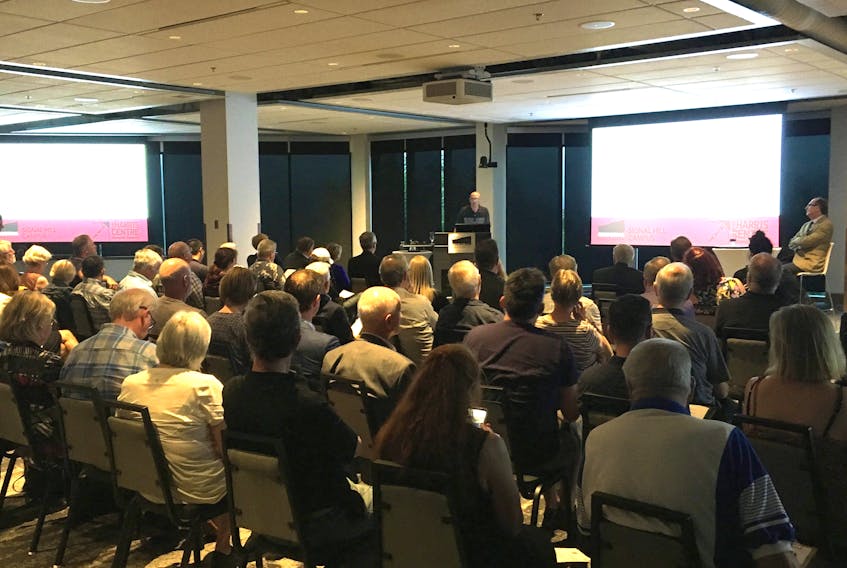ST. JOHN'S, N.L. — The plan: host a session to let people who were not called as witnesses at the Muskrat Falls Inquiry offer their thoughts on the megaproject, for the consideration of Commissioner Richard LeBlanc.
Two sessions were scheduled. The first was Tuesday night in St. John’s at Memorial University’s Signal Hill campus.
LeBlanc took notes at the back of the room with his co-counsel, as the time-limited speakers — a clock counted down five minutes each — drove home their points.
Over roughly an hour and a half, there were expressions of frustration about Nalcor Energy’s blown budget and timeline, outrage over evidence coming out of the inquiry and anxiety about what the project will do to power rates. But the 16 speakers also expressed desires for all manner of things reaching beyond the limits of LeBlanc’s terms of reference.
They called for improvements in civic education, facilitation of robust debate on future projects, democratic reforms such as campaign finance reform, a renewed commitment to responsiveness in the House of Assembly, consultations on how to best use Muskrat Falls power and more.
“The system” needs changes, they said.
“(The government) is a playground of elites that are trying desperately to maintain the status quo,” said Lori Lee Oates, not the first speaker, but one of the many offering strong opinions.
A part-time university lecturer who has worked in government, Oates said the province is not unique in needing to look at its political system and decision-making.
“There are too many examples of poorly managed infrastructure projects in our history. There can be no more. Citizens are no longer willing to tolerate it. We need democratic reform and our citizens deserve better governance now,” she said.
Retired political science professors Steven Wolinetz and Stephen Tomblin called for greater engagement on the broader issues.
Wolinetz said he believes the public failed to do its part in “engaging the argument” when it came to the Muskrat Falls project. Among other things, he suggested pushing for more meaningful exchanges between politicians.
Tomblin spoke about the need to actively discourage the idea of citizens as spectators.
“Muskrat Falls is the tip of the iceberg and not an accident,” he said.
“Unless or until democratic, federal reform occurs and the dominant power and capacity and autonomy of the (government) executive is reined in and contested, these patterns of bad decisions and risky behaviour will continue.”
Don Blackmore spoke generally about improvements in the province over time. Born in 1939 and growing up in Port Union, he said, he fished for cod at a rate of two cents a pound while becoming acutely aware of the high school dropout rate. Today, he said, the province faces everything from high unemployment to high rates of childhood obesity.
“How well have we used our democracy to improve ourselves?” he asked.
Lea Movelle condemned people offering lip service to Indigenous people and their concerns.
Zheng Li said she held a positive view of the Muskrat Falls project, in terms of it being part of a plan to move to about 98 per cent renewable energy, but believes the province needs to talk more about how it can use Muskrat Falls power to the greatest public good.
Bob Hallett offered some options for covering the project’s cost.
LeBlanc has been investigating how the power project ran from an estimated $6.2-billion (capital cost) to $10.1 billion. However, he is not making any findings of guilt in that regard.
Several speakers, including Kerri Claire-Neil, said the public needs an acknowledgement of the failures.
“I think if this inquiry is going to instill public trust it does need to have … someone needs to be held responsible for what happened and we the people deserve that, because we are the ones that are going to have to pay for it and face the consequences of their actions,” she said.
The evening included thank yous offered to Green Party Leader Elizabeth May and MHA Lela Evans for their attendance. May was a registered speaker, as was Green Party candidate Greg Malone.
A second public session mirroring the one in St. John’s is scheduled for the Lawrence O’Brien Arts Centre in Happy Valley-Goose Bay on Aug. 8.
The public portion of the inquiry will conclude with closing arguments Aug. 12-16 in Happy Valley-Goose Bay, with LeBlanc filing his final report at the end of the year.
RELATED









